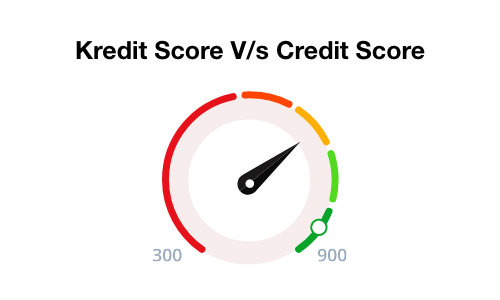Average Credit Score According to Age
Credit scores wield an influential power when it comes to personal finance, often indicating one's creditworthiness and financial stability. Understanding how these scores evolve across different stages of life is a crucial aspect of financial literacy. From the exuberant days of youth to the serene years of retirement, credit scores also embark on a journey of their own.
In this article, we will understand credit scores in the UAE while shedding light on the fascinating correlation between age and creditworthiness. As individuals progress through life, their financial responsibilities, behaviours, and priorities undergo significant transformations.
What is a Good Credit Score for Different Groups?
A lower credit Score is often associated with younger individuals due to their shorter credit and payment histories compared to their older counterparts. When we examine the influence of age on the 5 variables used in calculating a credit score and their respective weights, several trends emerge -
- Payment History, which accounts for 35% of your score, is better for older individuals who have made more payments over time. This can either boost their scores if they consistently make payments on time or lower them if they have frequent late payments. Older individuals naturally have a longer account history to draw from.
- The Credit Utilisation Ratio, comprising 30% of your score, can improve as you age, typically due to increased income leading to higher credit limits. A lower utilisation ratio, which measures how much of your available credit you use, can positively impact your credit score.
- Length of Credit History, making up 15% of your score, tends to increase as you maintain open accounts over time. This means that as long as you keep your oldest accounts active, they will contribute positively to your average account age.
- Credit Mix, accounting for 10% of your score, favours those who responsibly handle various types of debt. As you age, you're likely to have more opportunities to diversify your credit portfolio. For instance, an 18-year-old might only have a credit card, while a 40-year-old could have a mix of accounts like a car loan, mortgage, personal loan, and multiple credit cards.
- Recent Inquiries and Newly Opened Accounts, also worth 10% of your score, can temporarily lower your credit score when you open new accounts. Older individuals who already have established accounts may be less prone to these hard inquiries that negatively affect their scores.
It’s worth remembering that hard inquiries typically cease to impact your score after a year.
All of these factors contribute to an overall improvement in your credit score over time, assuming that you consistently manage and pay off your debts. This leads us to another reason why average credit scores tend to rise with age — increased financial responsibility.
As people grow older, they generally mature and exhibit greater responsibility in managing their finances. Moreover, the longer time span allows individuals to recover from past credit mistakes. Many negative credit items stop affecting your score after seven years, provided you maintain good credit habits.
Average Credit Score for Ages 18 to 25 Years (Gen Z)
The average credit score for the age group of 18 to 25 years, where people usually start establishing their scores, is usually around 679.
This age bracket mostly includes students who can get a lower credit limit student credit card and student loan. The reason why the average credit score might be on the lower side is that students relatively have a lower income, higher utilisation, and short payment history.
Average Credit Score for Ages 26 to 41 Years (Millennials)
The average credit score for this age band is typically 687. At this stage, their earnings are on the rise as they advance in their professions. A significant portion of individuals in this demographic may also have been managing mortgage or auto loan payments, broadening their credit portfolio beyond credit cards and student loans.
Average Credit Score for Ages 42 to 57 Years (Generation X)
The average credit score for this age group is generally 706. In this period, individuals might find themselves co-signing student loans for their kids and exploring ways to refinance like consolidating debts in order to trim down their financial obligations and get ready for retirement.
Additionally, it's advantageous that people within this age group are currently in the peak years of their earning potential.
Average Credit Score for Ages 58 to 76 Years (Baby Boomers)
Credit scores persistently increase (and at an accelerated pace) as individuals enter their senior years. During this period, the typical credit score hovers somewhere around 742, a rating classified as ‘very good’.
People in their 60s boast extensive credit histories, often accompanied by substantial savings and the rewards of retirement plans established over many years. A portion of this demographic may be diligently settling any remaining debts to free themselves from financial obligations prior to retiring from their careers.
Average Credit Score for Ages More than 77 Years (Silent Generation)
In their late seventies, individuals tend to have stabilised their credit scores, typically averaging 760 points. Nevertheless, people within this age group tend to shy away from using credit as they aim to avoid accumulating further debt. This is often attributed to their reliance on sources such as Social Security, pensions, and retirement savings for sustenance.
In essence, members of the silent generation tend to maintain nearly flawless credit scores. This is largely because of their diligent efforts in paying off various financial obligations such as mortgages and credit card debt, which can have an impact on their creditworthiness.
At What Age Does Credit Score Improve the Most?
Consumer credit scores usually start to increase notably during a person’s 30s and 40s, although the most substantial boost is observed from the late 40s to 60s which can lead to an impressive surge of 36 points.
In their 40s, consumers' financial accounts have usually matured sufficiently to warrant a more significant rise in their credit scores. However, this age group tends to grapple with elevated debt levels and the management of multiple credit accounts, including credit cards, student loans, and mortgages. These obligations tend to diminish significantly by their 60s — either through repayment or refinancing — with credit card debt accumulating less due to retirement.
| Credit Score for different types of Loan | |||
|---|---|---|---|
| Credit Score for Personal Loan | Credit Score for House Loan | Credit Score for Car Loan | Credit Score for Student Loan |

More From Credit Score
- Recent Articles
- Popular Articles












